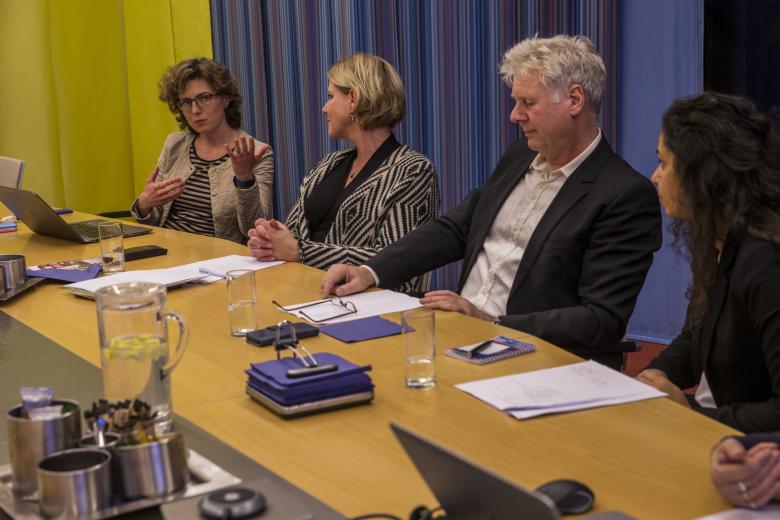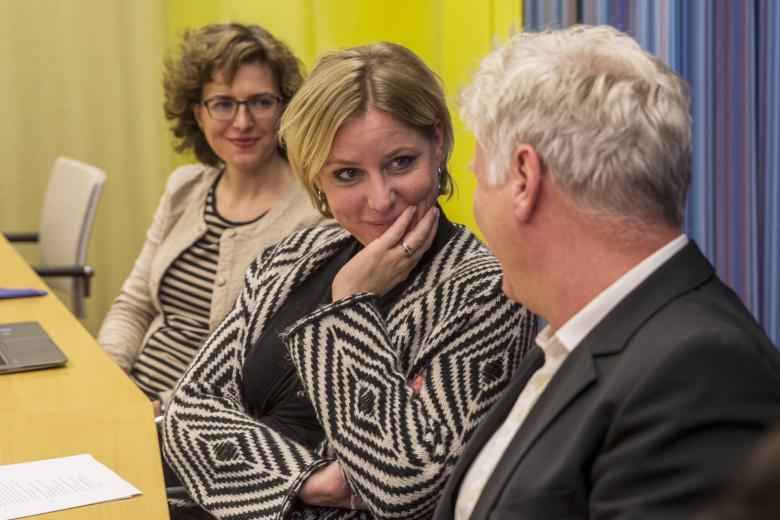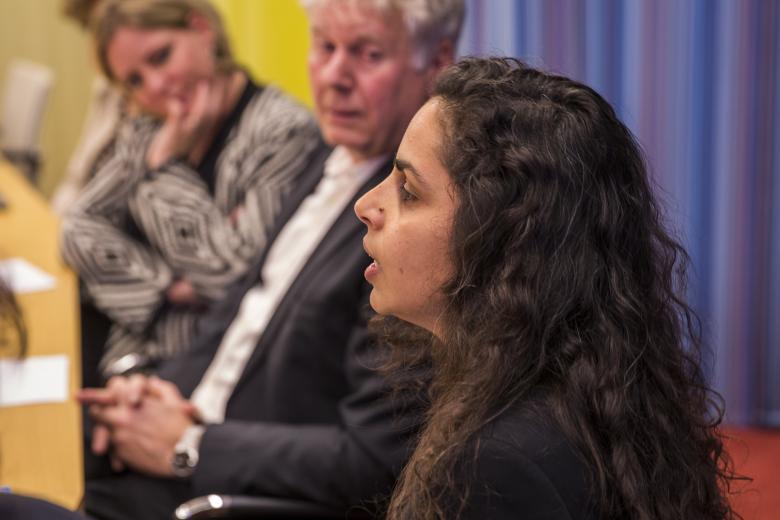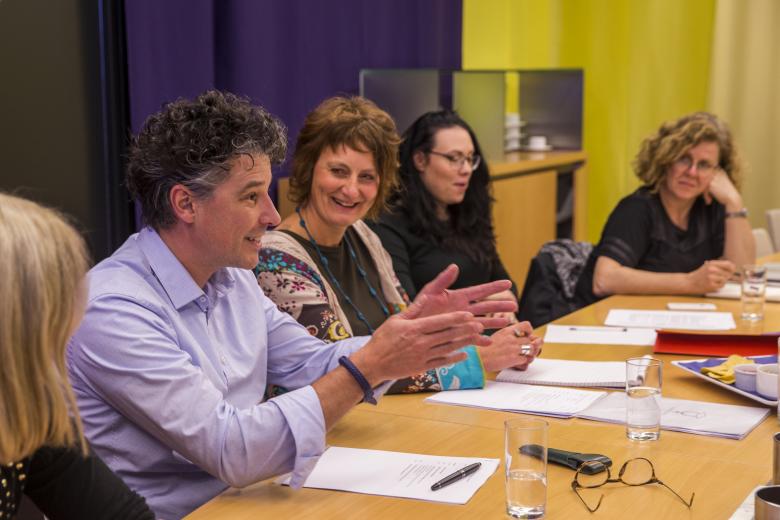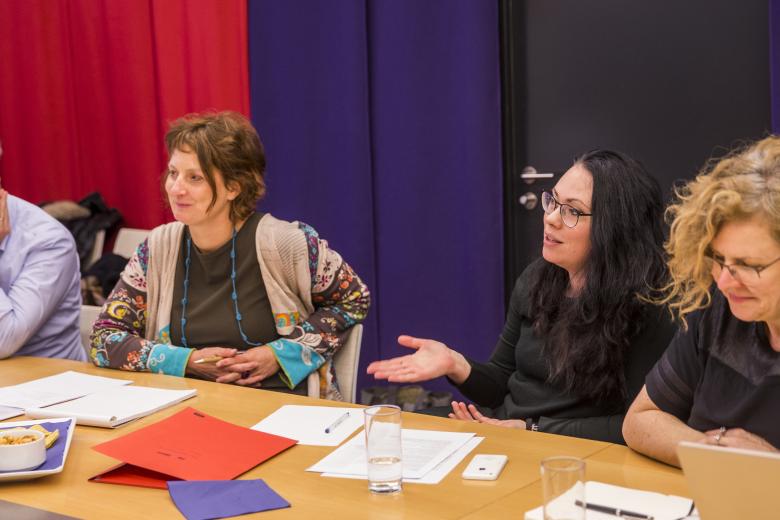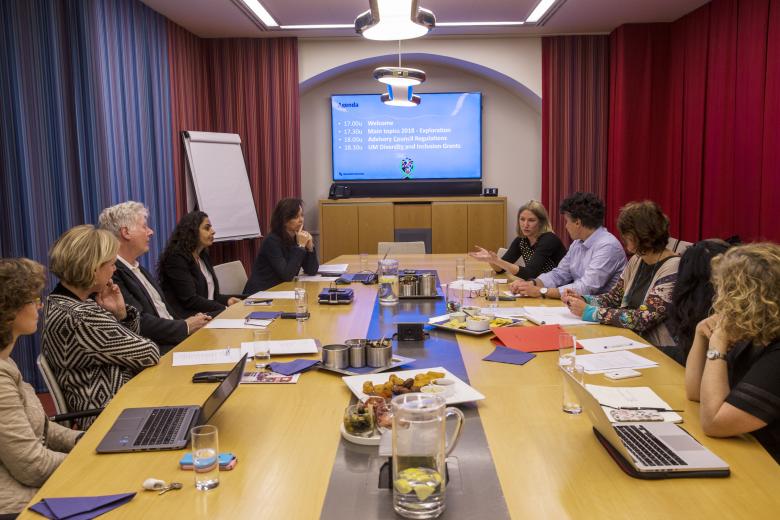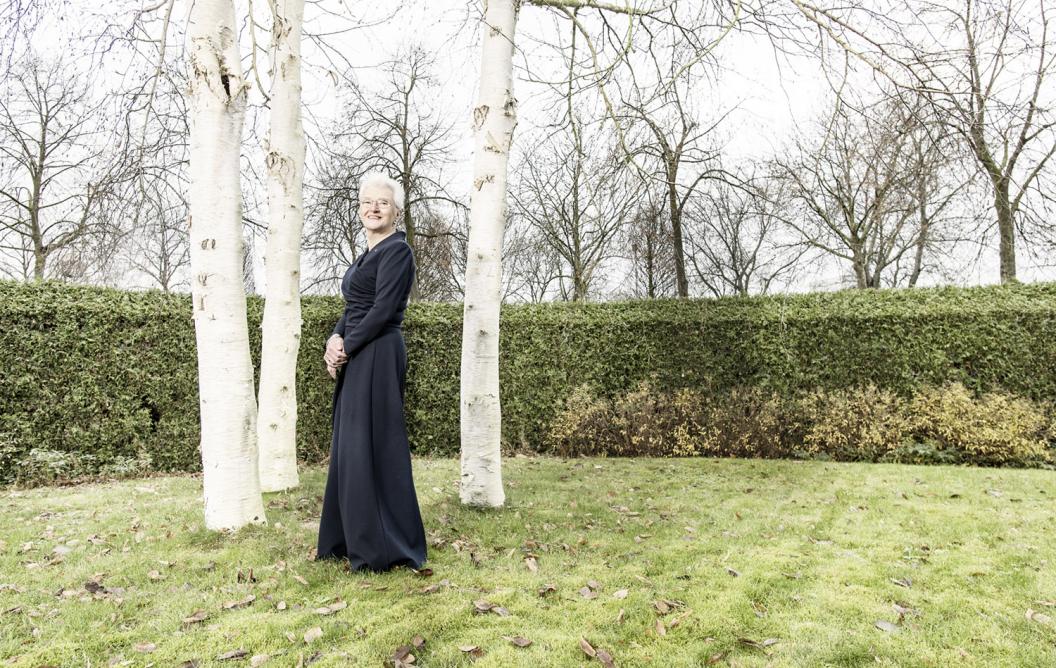Members of the UM Diversity & Inclusivity Advisory Council:
Marja van Dieijen, President of the Maastricht UMC+ Executive Board
Isabella Grabner, Associate Professor of Accounting, School of Business and Economics
Didier Fouarge, Professor in Dynamics of Skills Allocation, School of Business and Economics
Cerien Streefland, Managing Director, Faculty of Arts and Social Sciences
Fred Zijlstra, Professor of Work & Organizational Psychology, Faculty of Psychology and Neuroscience
Lana Sirri, Assistant Professor in Gender and Religion, Faculty of Arts and Social Sciences
Vigjilenca Abazi, Assistant Professor International and European Law, Faculty of Law
Albertine Zanting, Senior Policy Advisor Internationalisation and Researcher of Cultural Diversity, Faculty of Health, Medicine and Life Science
After working in the consultancy area for luxury brands, he feels very connected to the highly innovative, creative, flexible and fast paced environment that eBay is. “Twenty Two years ago, eBay was founded in Sillicon Valley but unlike some other companies that originate from there, the founder stayed true to this one mission that he strongly believed in and still does obviously: Creating and maintaining a marketplace that is equally accessible to everybody creating economic opportunities around the world.”
Instead of moving back to Finland, where he is originally from, he moved to Brussels straight after graduating from European Law School. Together with his wife, who he met during his studies in Maastricht, he loves the Brussels’ life. So many friends and colleagues are, just like us, far away from their families which makes it easier to connect. Also, the enormous amount of professional opportunities, good salaries, affordable houses, facilities and lots of green spaces make it, by all means, a pleasure to live here. The ‘challenging’ Belgian administration is insignificant compared to these secondary conditions.
Although not in Maatricht anymore, he still feels strongly connected to Maastricht University. He gave lectures, was a guest speaker at skills trainings and met with future graduates at a Career Day. He’s recently been asked to join the External Advisory Board of the Faculty of Law in order to further develop the study programmes and check whether it aligns to the quickly changing labour market. “The strong connection with the university proofs to be beneficial for both eBay and me. We are assured of fresh intellectual input and the university stays up-to-date with trends, developments and needs. For example, I’m currently cooperating with a Tax Law Master student on her thesis on the EU VAT framework for e-Commerce”.
10 years ago, he fell for the reputation and the international character of UM on the one hand and the charming city on the other. “Once a student, I was specifically blown away by the quality of teaching, discussions with my peers and the room the university gives students to build their own profile. The amount of extracurricular activities was huge! I worked as a student assistant for the Department of International Property Law which allowed me to learn a great deal extra from Professor Anselm Kamperman Sanders and work on my network. We’re still in touch. He even invited me to speak on a conference the other day. It steered my career development really…”
I really feel home at the interface of law, business, and politics and think I’ll keep working in this area in one form or another for a very long time. I think the economy and society at large need people who bridge the worlds of politics and business – everyone loses if legislation does not work in practice.
Samuel Laurinkari, graduated from the European Law School of Maastricht University in 2009 and now works as a Head of European Union Affairs at eBay.
By Charlotte Groven
December 2017
“Jo Ritzen called to ask if I wanted to come and supervise him,” she laughs. “Back then it was still okay for a director to meddle in the composition of the Supervisory Board. The rules have been tightened since then, and rightly so.” Given the calibre of her resume, Ritzen approached her for good reason.
Once upon a time a jack-of-all-trades at the Holland America Line, Truze Lodder worked her way up to head of finance at the AVRO, a public broadcaster. After a brief foray into the advertising world, she and the artistic director Pierre Audi together revived the Dutch National Opera, turning it into a thriving business of international renown. If that wasn’t enough, she was serving at the same time on the supervisory boards of a number of institutions, including the railway operator NS and banking institution Van Lanschot. But UM had its sights trained on too, despite her being, in her own words, ‘a girl who’s never seen the inside of a university’.
Truze Lodder is proud of her status as a self-made woman. Everything she knows, she learnt on the job. Still, in 2004, shortly after being appointed to the NS supervisory board, she decided to join the Commissarissencyclus, an executive education programme in governance at Nyenrode Business University. “It didn’t take a lot of effort, so that was good for my self-confidence. But I didn’t learn much that was new to me.”
Precocious
Lodder has always been a good learner. Being the smartest kid in class made her the apple of her teachers’ eye, but also caused envy among her peers. The TT (Tegen Truze, ‘anti-Truze’) club was founded when she was in sixth grade, aged 11. Her classmates chalked TT onto the stone staircase at the front of her parental home. “That made me sad. But the universe was on my side, because when our apartment went up in flames and I was pulled out of class by the head teacher, that had a big impact on the class. The club was disbanded pretty soon after that. And I’m forgiving, so I never made a big deal out of it.” The universe was on her side, too, when she and her mother survived a serious car accident.
Lodder is the eldest daughter in a family of five children. She describes herself as a precocious child who always knew exactly what she wanted. “From the time I was a toddler, my mother didn’t have to lay out clothes for me; I chose them myself. And when I wanted to learn the piano at the age of eight I spent every lunch time for a year taking the scooter to the music school so I could practice, before a second-hand piano materialised at home. Later, when I had to choose between the gymnasium and a vocational high school, I went for the latter. Why would you spend six years at school when you could be done in five?”
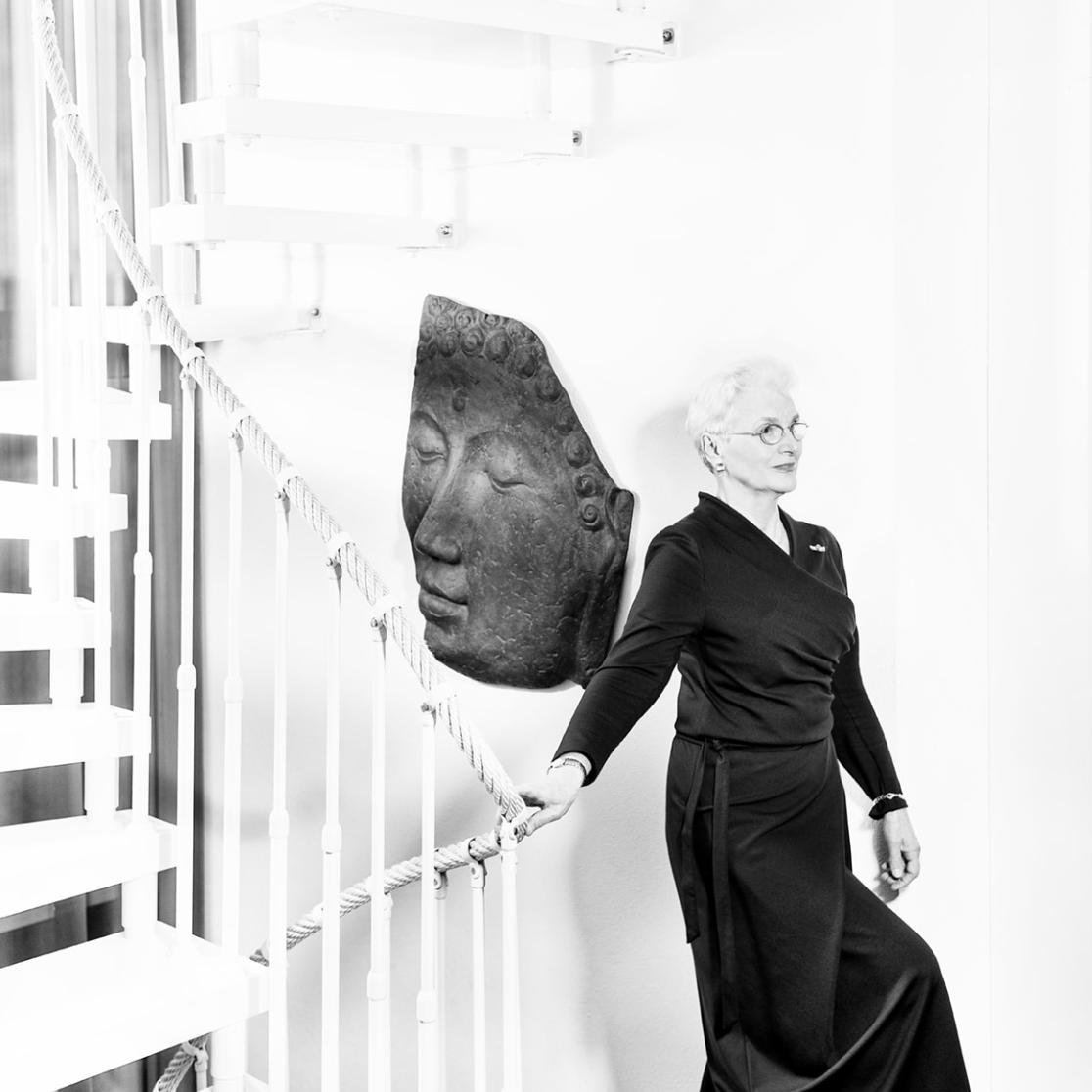
Father’s daughter
She had a close relationship with her father. He discussed everything with her, more even than with her mother. “I developed a deeper bond with my mother after my father’s death in 1985. Only then was I able to see the stability she’d provided. She was a wise woman.” Her father, on the other hand, was always searching for something. When Truze was three, they left their Protestant community in Oud-Beijerland and moved to Rotterdam. After excursions into the philosophy of Krishnamurti and the Freemasons, her father found the Lectorium Rosicrucianum, a school of Christian Gnosticism for the ‘universal teachings of all times’.
Money was tight. Her father, with his working-class roots and lower vocational education, went from job to job but never settled down. “He was very principled – I got that from him – but that meant he’d quit the moment he disagreed with his employer. Fortunately, I don’t do that,” she smiles. The uncertain financial situation left her keen to earn money rather than study, even if it went against her parents’ wishes. “I gave part of my salary to my father so he could keep the car on the road. My mother never knew.”
A beginning and an end
Her parents remained students of the Lectorium Rosicrucianum for the rest of their lives. For the family, this meant avoiding meat, alcohol and cigarettes. “And this while my mother was the daughter of a butcher. My youngest brother and sister were raised entirely vegetarian, and still can’t tolerate meat.” Truze was eight years old when her parents joined the Lectorium, which had a parallel programme for children. She has fond memories of this time – especially the annual summer camp, where she fell in love for the first time. “I was 11 and head over heels, but he wasn’t ready. It didn’t turn into something till I was 14.”
Although the philosophy gave her a strong foundation for life, she decided to part ways with the Lectorium Rosicrucianum at the age of 20. “I made a conscious choice to leave, but to bring with me what I’d learnt. I had to go my own way. One of the things I took with me was the awareness that everything that has a beginning also has to have an end. I’ve never wallowed in my grief, not with the death of my father, my mother, my first husband. I have felt grief, but I don’t make myself a victim. Losing someone is part of life.”
Perfectionist
It was in broadcasting that she met her first husband: the radio journalist and later manager of public broadcaster Tom Nieuwenhuijsen. He was 27 years her senior and had four children. “His marriage was already over. It was a rocky start; we must have split up 80 times, because he’d say ‘I’m too old for you’. He didn’t want any more children and felt he couldn’t impose that on me. Ultimately I respected his wishes and chose him. I’ve never regretted that. I think I’m too much of a perfectionist to combine both work and motherhood up to the standards I set for myself. This way I’ve been able to do my work to the best of my ability.”
She now enjoys the children and grandchildren of Tom and her current husband, Arie Visser; yes, the father of fashion designer Mart Visser. “It’s a miracle to have met another man who challenges me and knows me better than I know myself. It’s wonderful to be able to experience that again.”
Inner compass
She sees her career as being built on taking action. Don’t aspire, just do it. Know your characteristics and your abilities. “I’m not interested in status; the most important thing to me is the content of the work. In that way my career has always developed organically."
And she is stubborn. “I’ve tended to do things in life if I felt an inner certainty about them. I rarely ask others for advice; I prefer to follow my own compass. I have a strong sense of responsibility and think I should figure it out for myself.” She can’t recall a time when her intuition deserted her. Her successes include her choice of the then unknown Pierre Audi as artistic director of the Dutch National Opera and, recently, Rianne Letschert – also young and relatively inexperienced – as UM rector. It was Lodder who nominated Letschert for the job. “Compared to the private sector, I found Maastricht University as an organisation to be bureaucratic, slow and difficult to change. I said to Rianne, ‘The board needs a new dynamic. If you have courage, dare to be yourself and don’t become part of the existing culture, we want you.’”
As chair of the Supervisory Board, Lodder has always sought to act with integrity and transparency, without fear or favour. “It’s not always easy. There was a culture of talking in the corridors but not taking responsibility at all levels to solve problems. When that happens I get fierce – not angry, but passionate about getting things right. That’s been a common thread throughout my life. I’ve come to love this university; that’s why I’m so critical. Simplicity, ownership and unity: that’s what an organisation is all about. I’m glad I’m leaving at a time when things are going well.”
Although she now has more time for her hobbies – travelling, playing the piano and reading – she has no intention of slowing down. In July she took up a new board position on the pension fund of none other than the Holland America Line, the company that launched her career. Things have come full circle. Life is good in the universe of Truze Lodder.
Text: Annelotte Huiskes | Photography: Hugo Thomassen
Truze Lodder (1948) was head of finance at the AVRO (1974-1984), business director of the Dutch National Opera (1987-2013) and chair of Het Muziektheater in Amsterdam (1992-2013). Additional posts include treasurer of Europa Nostra, member of the supervisory boards of the NS, Van Lanschot and the Nexus Institute, and chair of the supervisory board of the National Youth Orchestra. She sat on the Maastricht University Supervisory Board from 2007 to 2017, as chair since 2014. In 2000 she was appointed Officer and in 2012 Commander in the Order of Oranje Nassau. In 2012 she was also awarded the Frans Banning Cocq Medal from the City of Amsterdam.
- The information provided will be used for registration for this event only.
- Maastricht University will keep your personal information confidential.
- The information provided is stored in a secure environment using encrypted web technology and treated confidentially, according to Dutch law (‘Wet Bescherming Persoonsgegevens’) and is solely used for information purposes and anonymous statistical purposes.
- Maastricht University will not share your information with third parties without your prior explicit permission.
- The information provided can be consulted and altered by sending an email to the contact person of the event.
Symposium 'The Future of a Data-Driven Society'
The information provided will be used for registration for the Master's Fair 2018.
Maastricht University will keep your personal information confidential.
The information provided is stored in a secure environment using encrypted web technology and treated confidentially, according to Dutch law (‘Wet Bescherming Persoonsgegevens’) and is solely used for information purposes and anonymous statistical purposes.
Maastricht University will not share your information with third parties without your prior explicit permission.
The information provided can be consulted and altered by sending an email to the contact person of the event.
